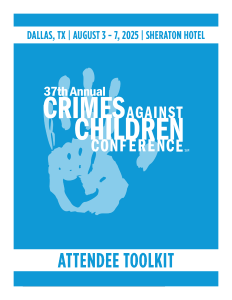Workshop
Marriott
Common Mistakes in the Forensic Interview: How to Overcome Them
Monday, August 4, 2025
2:00 PM – 3:15 PM CT
Location: Plaza A
Earn 1.25 Credit Hours
Target Audience: Law Enforcement, Prosecutor, Forensic Interviewer, CPS
.jpg)
Maria Rosales-Lambert
Lead Forensic Interviewer Specialist
Zero Abuse Poject
Primary Presenter(s)
Forensic interviews are a means of gathering information from an alleged child victim or witness. They are a key component to both criminal investigation of alleged child abuse, as well as the work of child protection. While forensic interviewers need to be specially trained, excelling at the art and science of forensic interviewing requires on-going reflection and practice. Some forensic interviewers can find themselves forgetting the philosophies that underlie core components in forensic interviewers as well as demonstrating a lack of refinement in forensic interviewing techniques. This can result in common mistakes such as a lack of episodic focus and investment in rapport, the lack of or ineffective transition statements, the use of faux invitations, a lack of corroborative detail, missed opportunities for interview instructions and reassurance statements and more. This training will provide an overview of common mistakes in interviewing and offer suggestions for overcoming these issues.
Learning Objectives:
- Identify common mistakes in forensic interviews and examine how they can create pitfalls in our interview and process.
- Consider ways to overcome common mistakes before, during and after the interview, including examples of sample language.
- Discuss ways to better reflect on forensic interviewing practice to identify and correct potentially problematic techniques.

